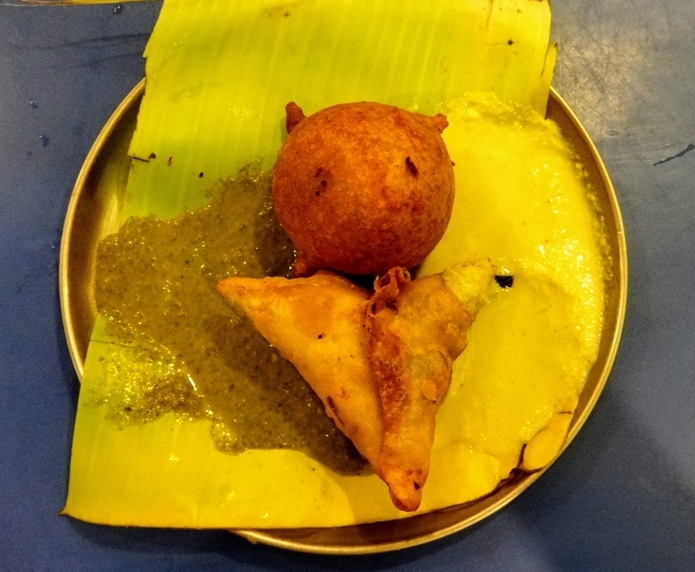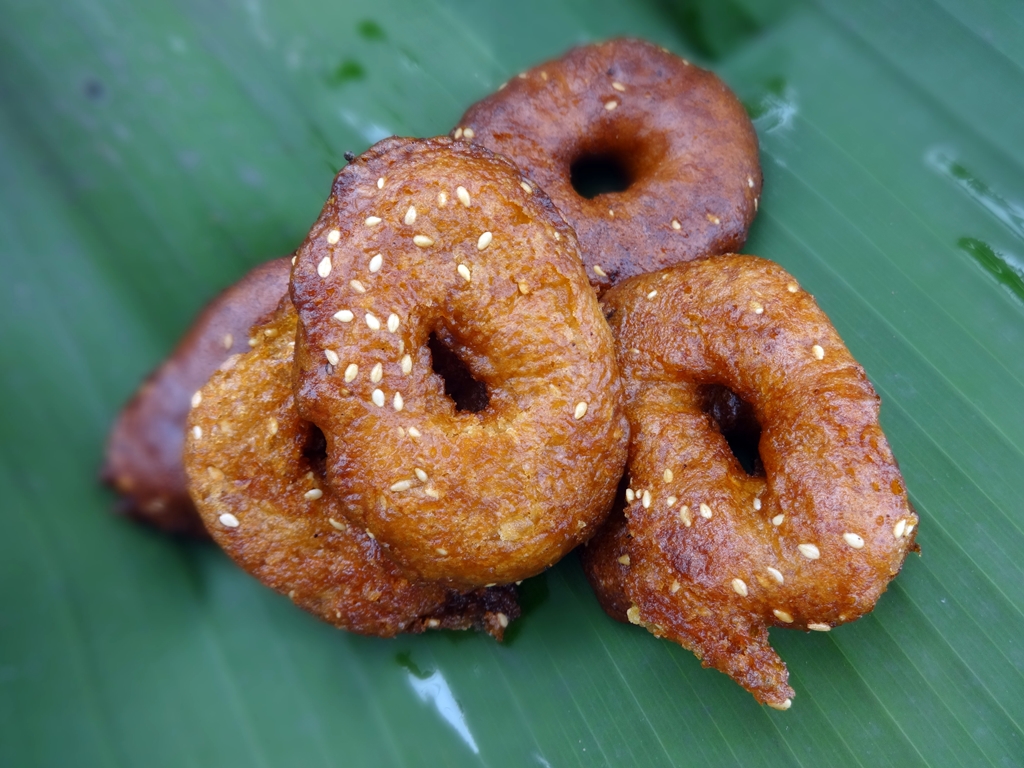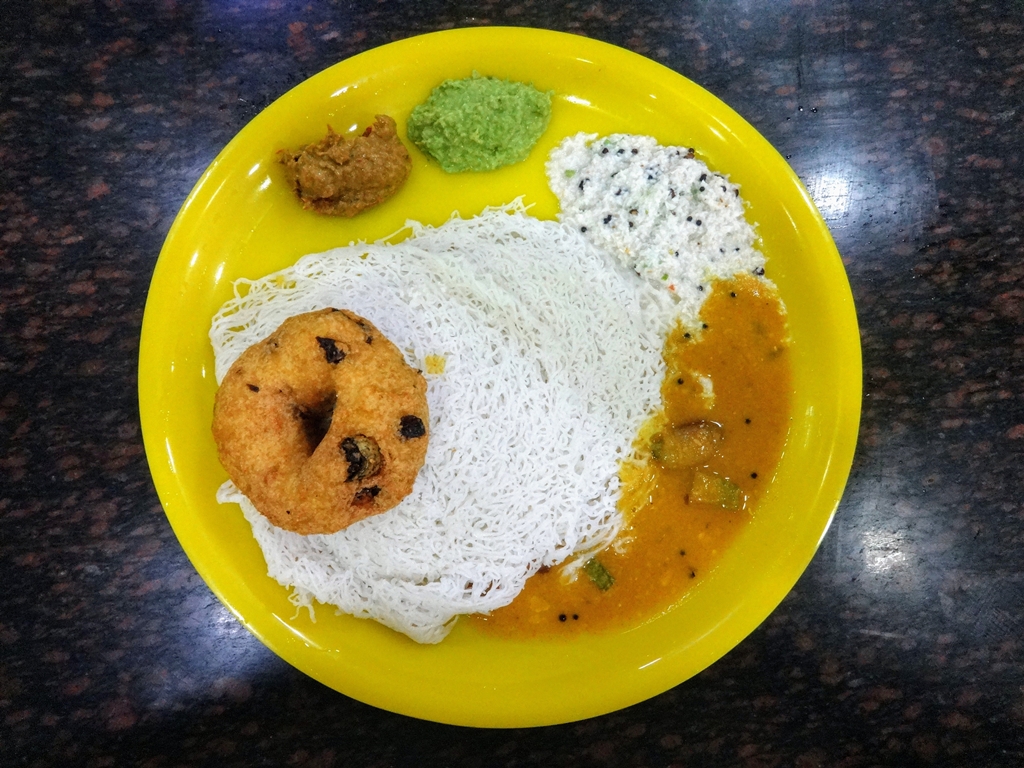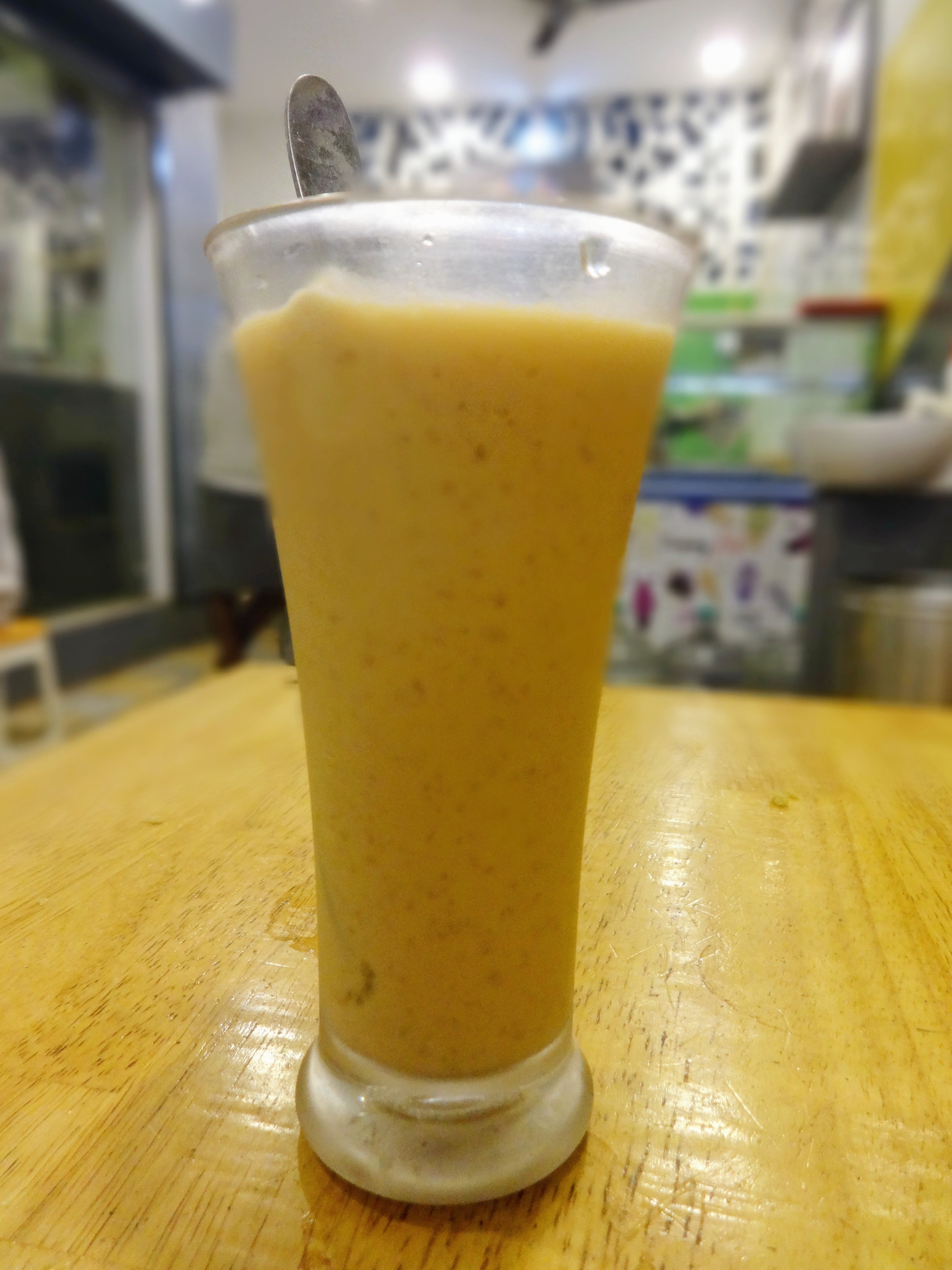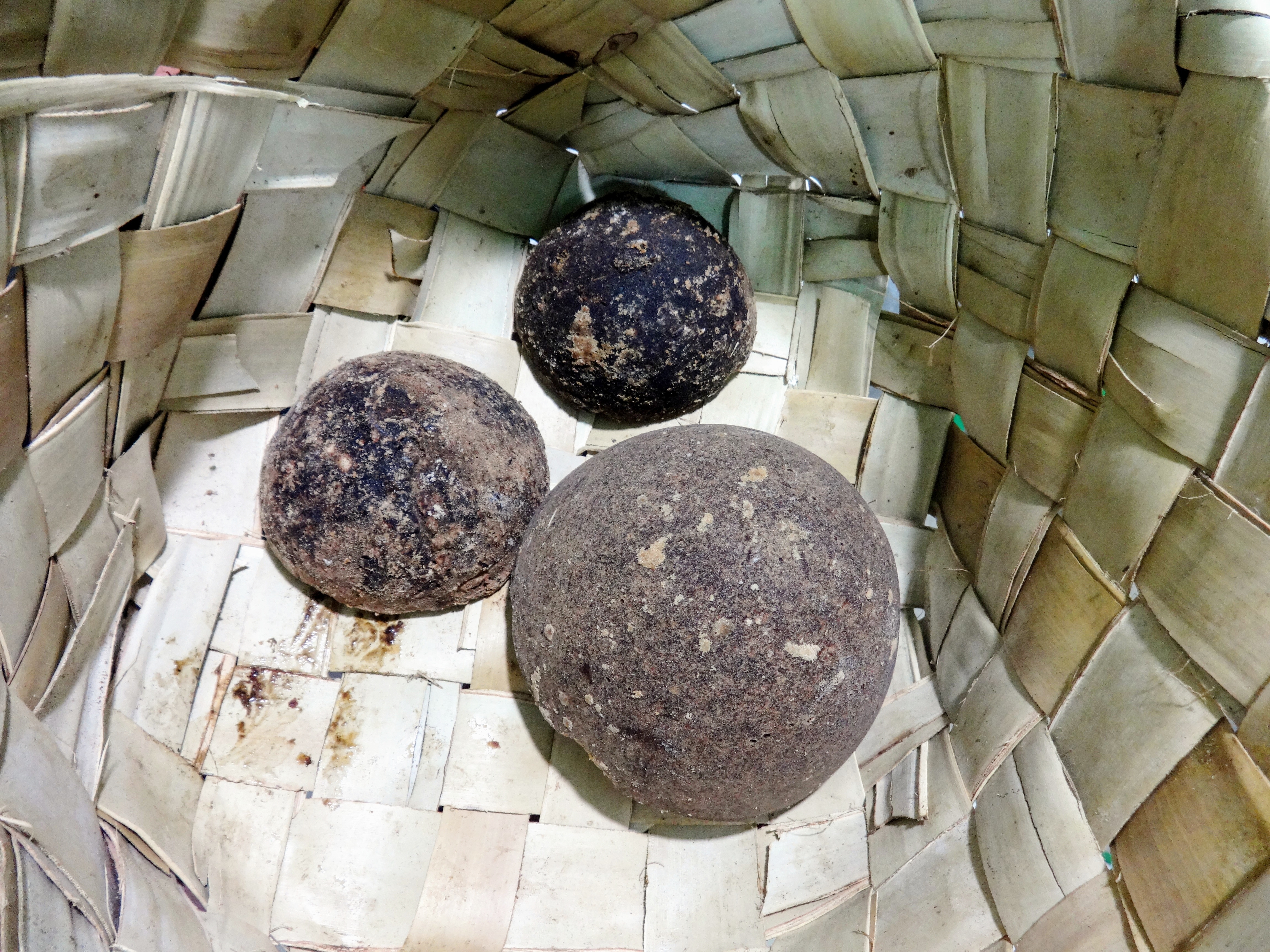Traditional cuisine
Popular Snacks in India
Bonda & Samosa
Bonda is one of the most popular snacks in India. It is a deep-fried dumpling stuffed normally with potato, but has various sweet and savory versions in different regions. It is often served along with breakfast or with coffee / tea as a snack. Samosa is yet another popular snack of India. It is a fried or baked pastry with a savory filling, including ingredients such as spiced potatoes, onions, peas, chicken and/or other meats. It is often served with different varieties of chutneys and sauce.
Karnataka
Kunda, Belgavi (Belgaum)
Kunda is a sweet made from khowa (khoya) and is a speciality of Belgavi in northern Karnataka. It is made of thickened milk and sugar with cardamom and dry fruits.
Dharwad Pedha
Dharwad pedha has its origins in Dharwad city in North Karnataka. Dharwad pedha has a history of over 175 years and has won a GI (Geographical Indication) tag. It is made from local milk which gives it its flavor. A mixture of milk and sugar is cooked on a wood fire till it turns brown. The pedha is then rolled in white sugar powder.
Kerala
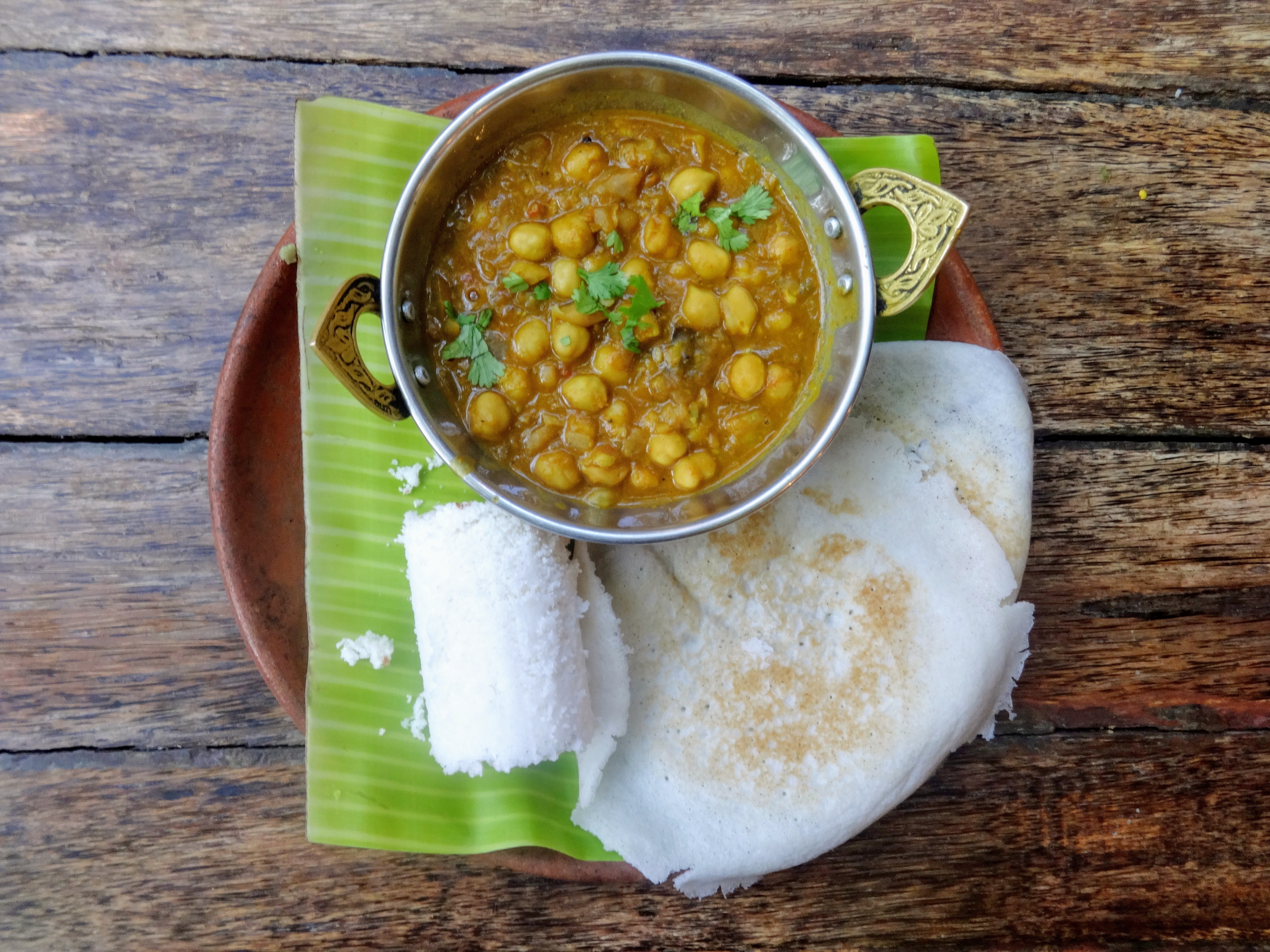
Rice puttu and Appam with Chickpea (kadala) curry
Kadala curry is a traditional Kerala favourite relished as the best combination for soft, fluffy appam, rice puttu and idiyappam for breakfast. This curry also goes well with rice and chapathi. Puttu is made of steamed rice flour and grated coconut, it has a unique taste and texture. It is made using puttu streamers that are cylindrical or cup shapes. Traditionally puttu was made in bamboo logs and this gave the puttu a lovely aroma. Appam are tasty, lacy and fluffy pancakes or hoppers from the Kerala cuisine that are made from ground, fermented rice and coconut batter. Thin and crispy around the edges with soft fluffy center appam taste delicious when paired with kadala curry or vegetable stew.

Kerala Sadhya (Meals)
Kerala, the land of spices has so much to offer in terms of food. Every region across India has its own take on the thalis and are as diverse and distinctive as the country itself. Of all regional delicacies, the Kerala thali is one of the ultimate Indian thalis that take you straight to the foodie heaven. Authentic Kerala thali is one of the Indian thalis you need to try at least once in life to taste the regional delicacies of God’s own country. It consists of different types of curries; stir fried veggies, payasam (dessert), papad, pickles served with Kerala rice.
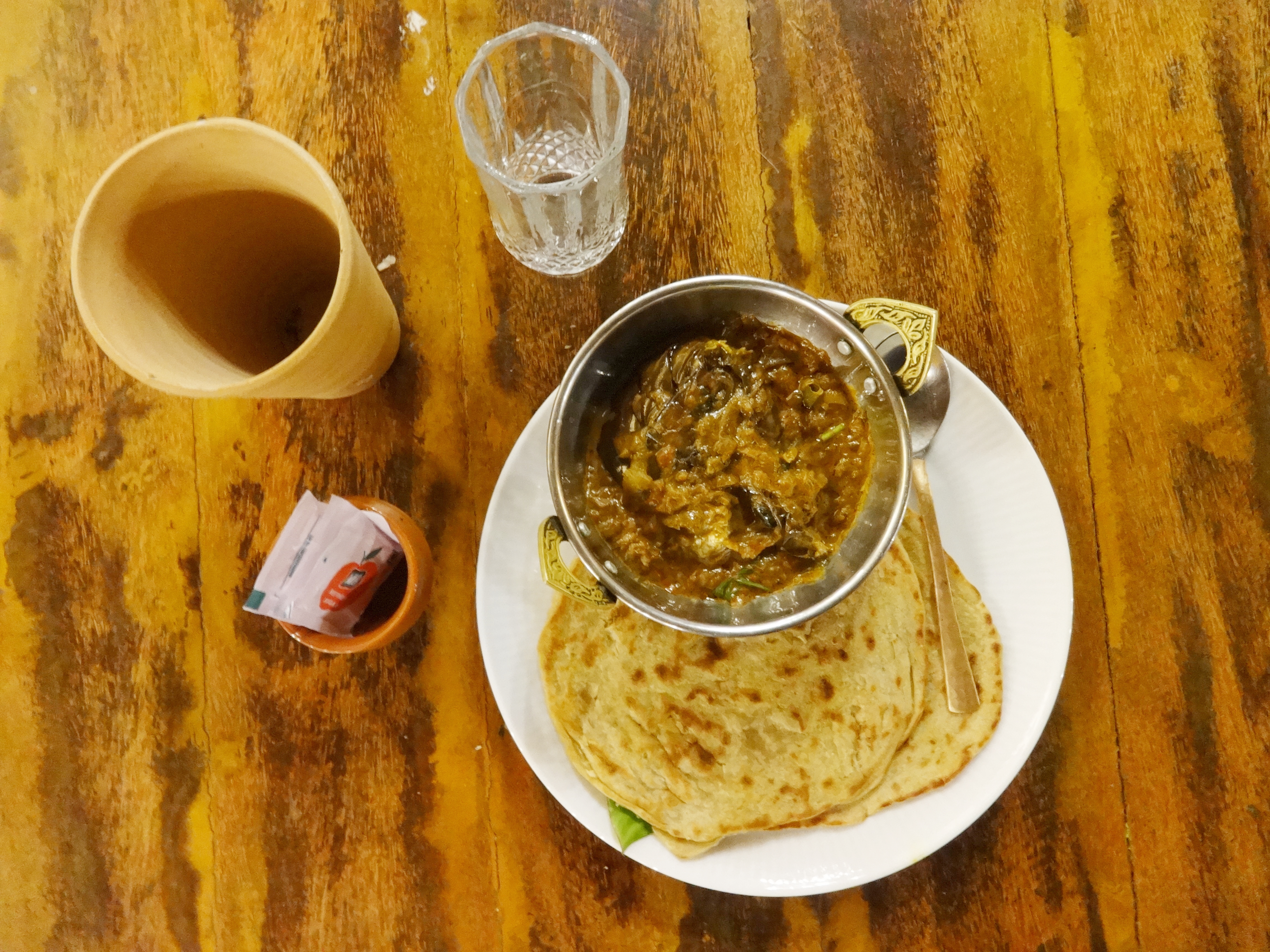
Kerala wheat parathas
Kerala wheat paratha or malabar wheat paratha is one of the most popular dish in restaurants across Kerala. Though parathas are usually made with maida or all purpose flour. Malabar wheat parotta is made with whole wheat/atta flour that makes it a healthier choice. It goes well with spicy veg and non veg masalas.
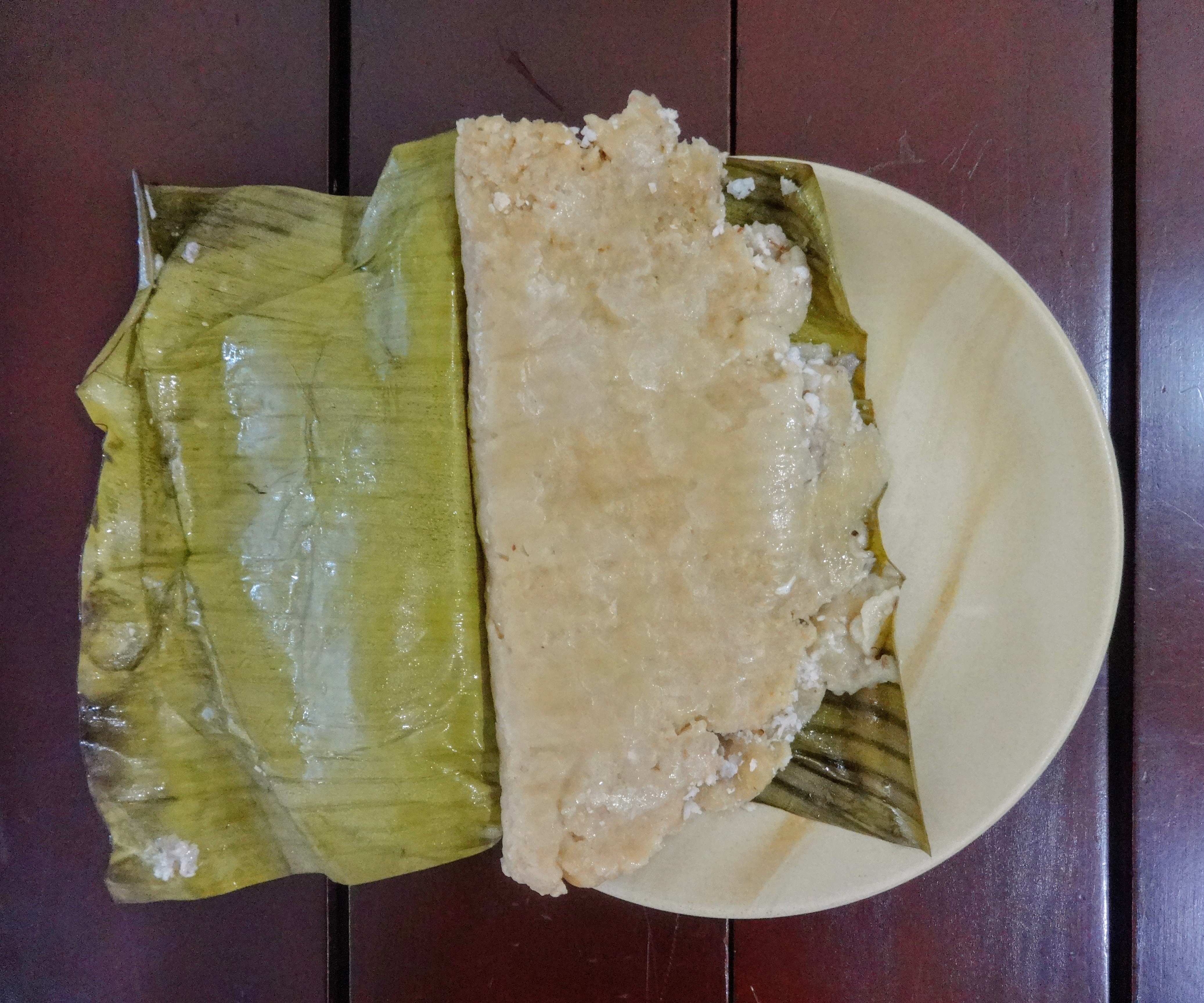
Ela Ada
One of the most celebrated desserts prepared in Kerala is elaada. This dessert is traditionally prepared in most parts in Kerala and enjoyed during festivals and occasions like Vishu, the New Year of Keralites. Ela translates to banana leaf, which is used to cover ada that is prepared using rice, coconut and jaggery. The smell and flavour of the banana leaf in which the ada is wrapped only adds to the taste of the steamed dessert.

Pazham Pori (Ripe Banana Fritter)
Ripe bananas dipped in batter and deep fried until crisp. This pazhampori is the ultimate snack from Kerala. Pazhampori is served usually along with tea / chai as a snack in the evening. Even a cold pori is delicious.These classic banana fritters brings together the perfect blend of textures – crispy outside, soft inside.The long Kerala banana, also known as the Nenthrapazham is used when it's ripe. The unripe ones are used for making banana chips.
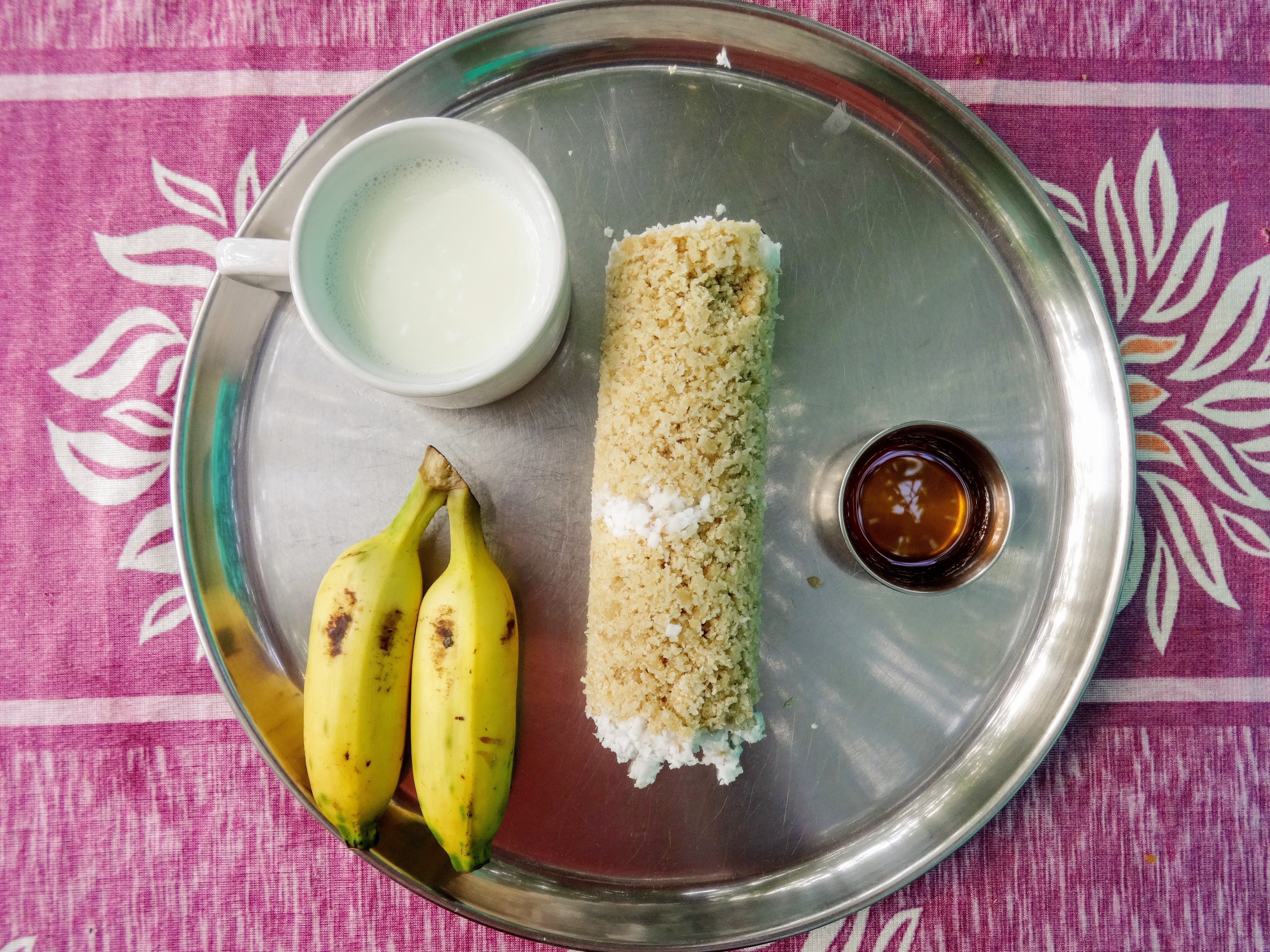
Wheat coconut puttu, bananas, milk and honey
India is a country with a rich culinary treasure, each state has its own signature dish which indicates its varied cultural heritage and confers a unique taste, flavour and aroma. One such healthy breakfast that is being largely relished in the South Indian state Kerala is Puttu. Wheat Puttu (steamed wheat cake) is one of the healthiest of breakfast dishes in Kerala Cuisine. This authentic south Indian delicacy is a perfect balance of sugar cooked with coconut and wheat. This one is healthier than the plain rice flour puttu.
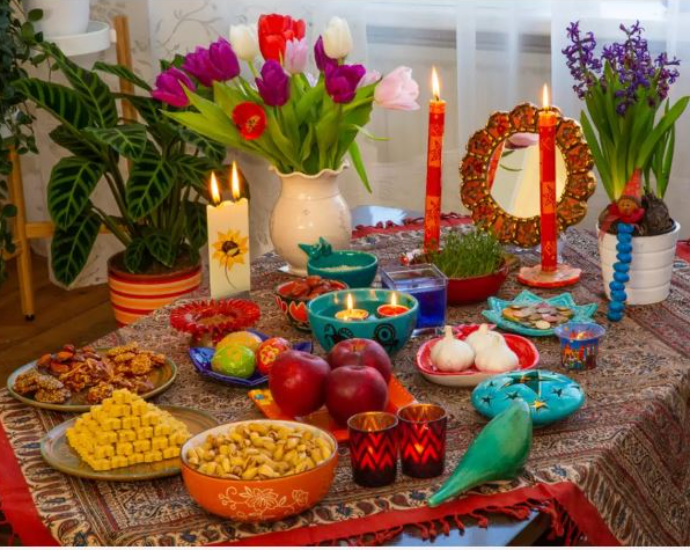
Parsi Food
On Pateti, Parsis prepare traditional delicacies like ravo and suterferni which are semolina and sev based sweet delicacies along with pulao dal or dhansak, patrani machi or fish wrapped in leaves, and meat delicacies like Sali Boti, a typical meat dish topped with finely chopped fried potatoes.
Tamil Nadu
Traditional Cuisine
South Indian Breakfast
Consisting of a combination of dishes, a South Indian breakfast is famous for its variety, flavors and colors.Perfect way to enjoy the typical south Indian breakfast and something to drool over – Idli, MedhuVada, Ghee Pongal, Kesari bath, Mini Dosa served with sambar and varieties of chutneys. The IdliVada combo is very popular.Traditional Breakfast Thali on a mini scale will be with Idli, Vada, and Sambar combination. The second would be with Pongal Combination.Most South Indians consider breakfast incomplete without MedhuVada.Dosa and idli are comfort foods and loved by most.
Adhirasam
Adhirasam is a traditional recipe of Tamil Nadu distributed during festivals especially during Diwali. Kajjaya in Kannada, Ariselu in Telugu - the adhirasam is deeply embedded in the culinary history of many southern states.They are similar in shape to vada, but are not savory and are eaten as a dessert.The authentic preparation takes about a week.There are inscriptions from the Vijayanagarempire that suggest it was a popular sweet dish in Krishna Deva Raya's royal kitchen. It's not just a food of the royals but also a food of the gods, and is part of the temple offering (prasad) at many temples and also poojas at homes.
Ashok Halwa

Ashoka Halwa is a traditional South Indian dessert which originates from the Thiruvaiyaru region in Tamil Nadu. A melt in the mouth delicacy made with moong dal, sugar, ghee, nuts and dry fruits. Ashoka sweet is a must during Tamil Iyer weddings, especially for those from the delta region in Tamil Nadu.It is an integral part of the wedding menu in Thanjavur district. This is not commonly available in sweet shops and is mostly prepared at home during special occasions. Making ashokahalwa is similar to making moong dal halwa, just that the texture of dal is extremely important since the south Indian version doesn't use any milk.
Idiyappam
Idiyappam is believed to have been originated in India and Sri Lanka. This comfort food has taken an important place in Indian Cuisine. The name idiyappam derives from the Tamil words idi, meaning broken down, and appam, meaning pancake. It is a steam cooked food and steam cooking has a very long history in India. Idiyappam are steamed rice noodles that are prepared using rice flour, salt and water. It is often served with variety of dishes such as stews, spicy curries, chutneys and coconut milk. In South India, there are several variations of flavoured idiyappam like lemon sevai, coconut sevai, tamarind sevai that are prepared by seasoning the thin noodles after they are steamed.
Traditional Drinks
Jigarthanda
Jigarthanda is a cooling dessert drink having its origins in Madurai city in Tamil Nadu, India. Jigar means heart and Thanda means cool or cold. The main ingredients of Jigarthanda drink are Badampisisn or almond bark gum, Nannari / sarsaparilla syrup, Bhai ice cream, Reduced milk and Nuts. You cannot stop with just one glass of this drink. One of the ingredients present, badampisin is known as a natural coolant. Moreover, it helps reduces body heat during summer months. Nannari syrup is known to be used in many cooling beverages. It is almost made like a thick shake, unlike a falooda, Jigarthanda is actually drinkable.It is usually served in glass tumblers and is known to be a body coolant, true to its name.
Palm Fruit (Nungu) Juice
A traditional summer fruit drink of Tamil Nadu made from the pulp of Palm (Palmyra) Fruit. The Tirunelveli district in Southern Tamil Nadu is one of the best places to find this tree, fruit and drink. It is also available in parts of Tamil Nadu where the Palm cultivation is more.Palms are believed to be among the oldest flowering plants in the world.It has amazing health benefits and it is mostly sold during summers. Palm fruit has anti-inflammatory and anti-oxidant properties.This fruit and sap combo drink is loaded with nutrients such as calcium, phosphorus, zinc, vitamins B and C and other minerals and natural sugars. This delicious summer drink is extremely low in calorific value and hence perfect for diabetics and for losing body weight. This lip smacking drink is also good for your hair, skin and stomach.
Palm Jaggery (Karuppatti)
Tamil Nadu's classic natural sweetener since ancient days. Palm Jaggery is known as PanaiVellam or Karuppatti in Tamil. The Southern districts of Ramanathapuram, Tuticorin and Tirunelveli are home to more than 50% of Tamil Nadu's palm trees. The unfermented palm juice collected from the trees is filtered and then boiled till it bubbles in iron vats. Once it's cooled, it is poured into moulds, most farms use coconut shells for the moulds. Once it is set in these moulds, the karupatti or karuppu (black) patti is ready for consumption. Karuppatti is used mainly in Sukku coffee and many traditional sweets of Tamil Nadu. Some of the sweet shops have started using this for making KaruppattiJalebi, Mysore Pak, Groundnut Chikkis and other sweets, and savouries. The health benefits of karupatti are amazing. It is high in vitamin B, iron and calcium. A great source of energy and the presence of iron make it a great for anaemia. It also has a much lower glycemic index.
Sukku Coffee (Ginger Coriander Coffee)
Sukku Coffee is one of the ancient Indian health drinks or beverages. Sukku is the Tamil word for dried ginger. Ginger is the key ingredient in this beverage. The traditional sukku coffee / kaapiworks best without milk. It also contains coriander seeds with crushed pepper and cumin (jeera) in the powder form and sometimes referred to as sukkumallikaapi (malli or kothamalli is the Tamil word for coriander). Sukku coffee is usually sweetened with palm jaggery that adds to the wellness quotient of this time-tested beverage. Sukku Coffee has many health benefits, including anti-inflammatory properties. It helps clear and soothe your throat and is also preferred for its digestive properties. It is a natural remedy for indigestion, cold, cough, throat pain and fever. Traditionally, the spices for sukku coffee were ground up coarsely in a mortar and pestle and boiled in water until the flavors and essence turned into decoction. It was then sweetened with palm sugar candy (panamkalkandu) or palm jaggery (panamvellam), which is extracted from a palm sap. It has low glycemic index, has a lot of nutrients and a great thirst quencher, cools down the body.
Traditional Cuisine
West Bengal
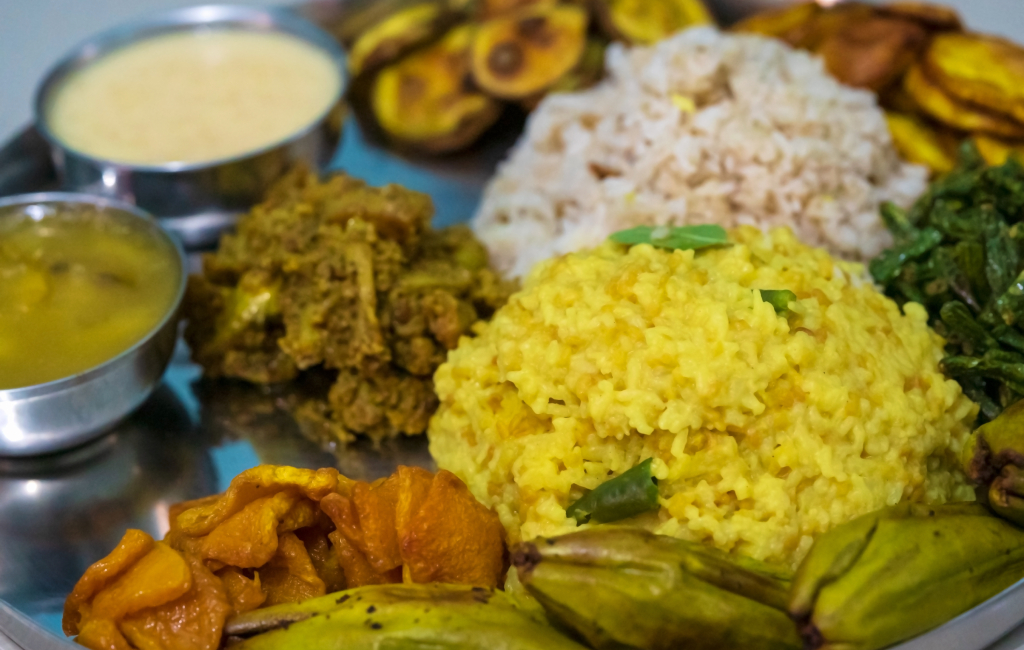
A typical traditional Durga puja bhog of khichdi, vegetable curry,
potato fritters, payesh, chutney

Meat Curry Bhog
A typical traditional Durga puja bhog of khichdi, vegetable curry,potato fritters, payesh, chutney
The favourite breakfast of Bengali's is luchi or Puri and aloor dum (Bengali version of dum aloo) alongwith jalebi, Rabri and sondesh or some other bengali sweet. On special occasions such as Poila Baisakh- Bengali New Year, the lunch menue would include, Steamed rice or pulao, dal, 2-3 different kinds of fries like begun bhaja (fried brinjal), aloo bhaja ( thinly sliced fried potatoes), kumro bhaja ( fried pumpkin slices), posto bora (poppy seed fritter2-3 vegetable curries like the iconic shukto (a bittersweet curry of unripe banana and other vegetables), potol er dorma (a parmal dish) , aloo Posto (potato poppy seeds curry); along with numerous fish and mutton delicacies like Chingri malaikari ( jumbo prawn dish), shorshe ilish (Hilda cooked in mustard), mutton kosha ( a typical Bengali mutton curry). The meal ends with a sweet and sour chutney made with mango, pineapple or a simple tomato one, followed by papad and dessert like misti doi and payesh.
There is a lavish spread at Durga puja and food is part of the celebration. Unlike Navratri, non-vegetarianfood is also included in the celebration. Sacrificing a goat on every day of the last 4 days of the puja is part of the rituals and tradition. The sacrificed goat is then cooked without garlic and onion and offered as bhog (the bhog also contains khichdi and vegetable curry) to the Goddess which is then savoured by the whole community as ‘Niramish Mangsho’ or Vegetarian Meat Curry. This ritual is particularly important on the 9th day of Navratri in Durga Puja. People generally fast before this bhog ritual and offer their pujas in form of flower prayers called Anjali. This Anjali is very special on the 8th day called Mahastami and Bengalis generally have a puri and aloo sabzi meal after this.
Potato Fritters, Payesh, Chutney
Chitpur in Central Calcutta is a hub for merchants and traders and is known as Barabazar - the largest wholesale market in the city. This area has some of the famous muslim delicacies including “Bakarkhani”, Haleem and Nihari. A feast of enormous proportions goes on the pious month of Ramzan. Shops like the Royal Indian Hotel, Aminia, Haji Alauddin Sweets, Adam’s Kebab are traditional shops, more than 100 years old.


